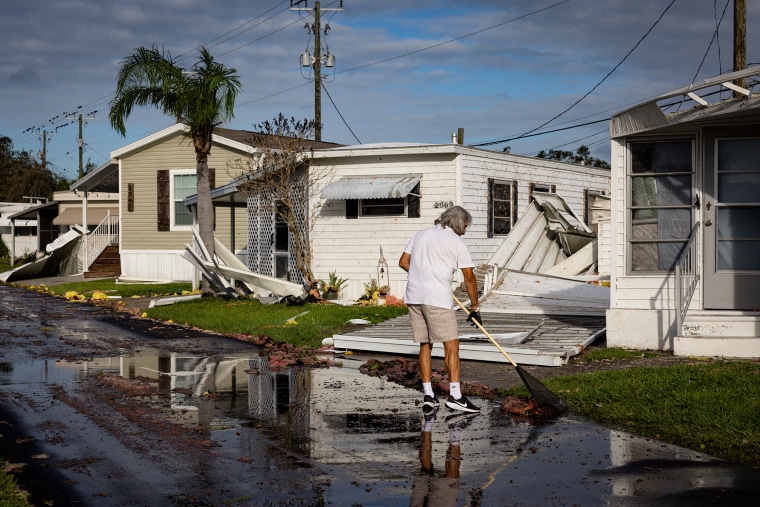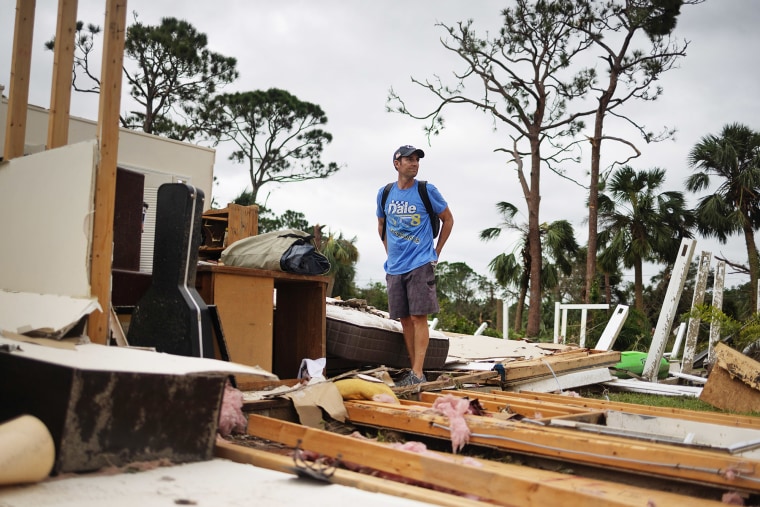Bridgette Bello thought she’d taken proper precautions to protect against Florida’s notorious hurricanes, having purchased flood insurance as well as a separate hurricane-specific policy, in addition to her regular homeowners coverage.
Yet nearly two weeks after Helene hit — and even before Milton had arrived — what Bello, 54, describes as an insurance “nightmare” has only begun. She said she already faces delays and denials on her damage claims.
“We did everything we were supposed to do,” said Bello, who lives near the barrier-island Madeira Beach community outside of Tampa. “We did everything to protect ourselves and protect our home.”
Fresh off the one-two punch of Helene and Milton, hurricane victims in Florida — even those with insurance — face a challenging recovery. The insurance industry is categorizing the storms as two separate events, meaning anyone who did not or could not document damage from Helene could face even greater odds that their claim will be denied if they were hit by both storms.
Meanwhile, reforms enacted in Florida to encourage insurance companies to re-enter the state market have ended up leaving victims with little legal recourse to challenge claims decisions.
“Most people are trying to maximize their damage estimate and looking for insurance companies to pay their claims,” said Rick Tutwiler, president of the claims adjusting firm Tutwiler & Associates. “A lot of people don’t know what they’re walking into.”
For the vast majority of affected residents, the financial loss from the storms will be nearly total. That’s because flooding caused much of the property damage — and most homeowners insurance policies do not cover any flood impact.
In the areas of Florida most affected by the storms, no more than 25% of residents had separate flood insurance prior to the storms hitting, according to an NBC News analysis of U.S. government data. Flood insurance coverage was significantly lower in regions of lower Appalachia affected by Helene.
For those who do have insurance, the combination of the storms is set to create major complications.

The insurance industry is categorizing Hurricane Helene as an almost entirely flood-driven event. While Hurricane Milton was both a wind and rain event, experts say property owners who lacked flood insurance may not be protected from water damage from Milton either, thanks to the way many insurance policies are written these days.“In a situation like this one, chances are very, very good that your insurer will deny your claim right out of the gate if you don’t have flood insurance,” said Amy Bach, executive director of consumer group United Policyholders.
Because so much of the damage from Helene came from flooding, losses that insurers are facing from that storm are projected to be “modest,” said Mark Friedlander, director of corporate communications for the Insurance Information Institute, which represents the insurance industry.
It is too soon to tell how many homes could end up having claims from both Helene and Milton. But in such cases, Friedlander acknowledged it could be “challenging” to make determinations about which storm caused what — and thus what is owed.
In particular, adjusters will have to determine whether any water damage from Milton came in “from below,” which could then be classified as flood damage; or “above,” as a result of wind-driven rain, Friedlander said.
Yet even in the latter case, coverage may be denied if it was determined the rain intrusion was the result of pre-existing maintenance failures, like a leaky roof or improper insulation. Many policies also exclude wind-driven rain as a matter of course.
For victims facing catastrophic losses due to water damage from either storm, many “are just walking away,” Friedlander said. “Most people can’t realistically afford to rebuild their homes.”
Patti Drew’s home in Punta Gorda, on Florida’s southwest coast, flooded during both Helene and Milton. Her daughter-in-law, Deborah, said Drew, 81, didn’t even have regular homeowners insurance — a decision she shares with approximately 1 in 6 residents in surrounding Charlotte County.
With only a fixed income to live on, Drew is hoping a GoFundMe page that Deborah has set up will provide some relief.
“I’m heartbroken. I don’t know what else to say,” said Drew. “I mean, we can’t do anything about it.”
For victims like Drew, the only available financial assistance is through the Federal Emergency Management Agency, experts say. FEMA, now the subject of a runaway series of baseless claims about its disaster response and financial wherewithal, had already issued $344 million in relief to some 375,000 households as of Wednesday, before Milton hit.
Yet even victims who do have flood insurance are learning they are facing a financial calamity.
The National Flood Insurance Program (NFIP), the government-backed plan covering 95% of flood insurance policyholders in America, only covers losses up to 50% of what it deems a property to be worth — not including the land that the property sits on.
Beyond the 50% mark, a home must be essentially rebuilt from scratch, almost entirely out of pocket, so that it is brought into compliance with FEMA flood regulations.

As a result, Bello, the Tampa-area resident, and her husband are expecting no more than $190,000 to repair their home, which they said was worth at least seven figures based on similar sales in their neighborhood.The NFIP also does not provide any funds for temporary housing relocation, so the couple had to pay out of pocket to find accommodations in the meantime.
A spokesperson for the NFIP, which is administered by FEMA, did not respond to a request for comment.
On Thursday morning, as she drove back from accommodations she’d secured in Orlando, Bello told NBC News she still didn’t know the total damage her home sustained from Milton, though she said her dock and a fence were “gone,” according to neighbors.
She said she’s received about $3,100 from FEMA so far.
Faced with denials, policyholders may be tempted to sue. But in Florida, homeowners must now essentially pay directly out of pocket to initiate legal action against their insurers. A set of reforms passed in 2022 aimed to limit a flood of contingency cases the insurance industry said had been making it impossible to operate in the state.
The reforms did help stabilize the market, and Friedlander said some companies even filed for rate reductions this year, before the fall storms hit.
But now, with the threat of legal action reduced, many insurance companies may be more incentivized to make denials essentially automatic, said Martin Weiss, president of Weiss Ratings, an independent insurance ratings agency.
“With the financial pressures on the industry, there’s very strong motivation to find every possible way they can” to deny a claim, Weiss said. “And if the company is new and inexperienced, their attitude might be, ‘What do we have to lose? Let’s deny and see what happens.’ At least before there was the repercussion of a lawsuit. But now even that is gone.”
The set of circumstances now at work in Florida has begun prompting calls for more comprehensive reforms, with some state elected officials demanding changes to how the insurance industry addresses hurricane damage.
Along with them is an acknowledgment of failure, given the state’s familiarity with such storms.
“I might be the first member to ask to work with the members from the affected areas to drastically change how we do insurance in Florida,” Broward County Republican state Rep. Chip LaMarca posted on X Wednesday. “I don’t care what the solution is, but I want to find one for every Floridian. We must fix it.”
